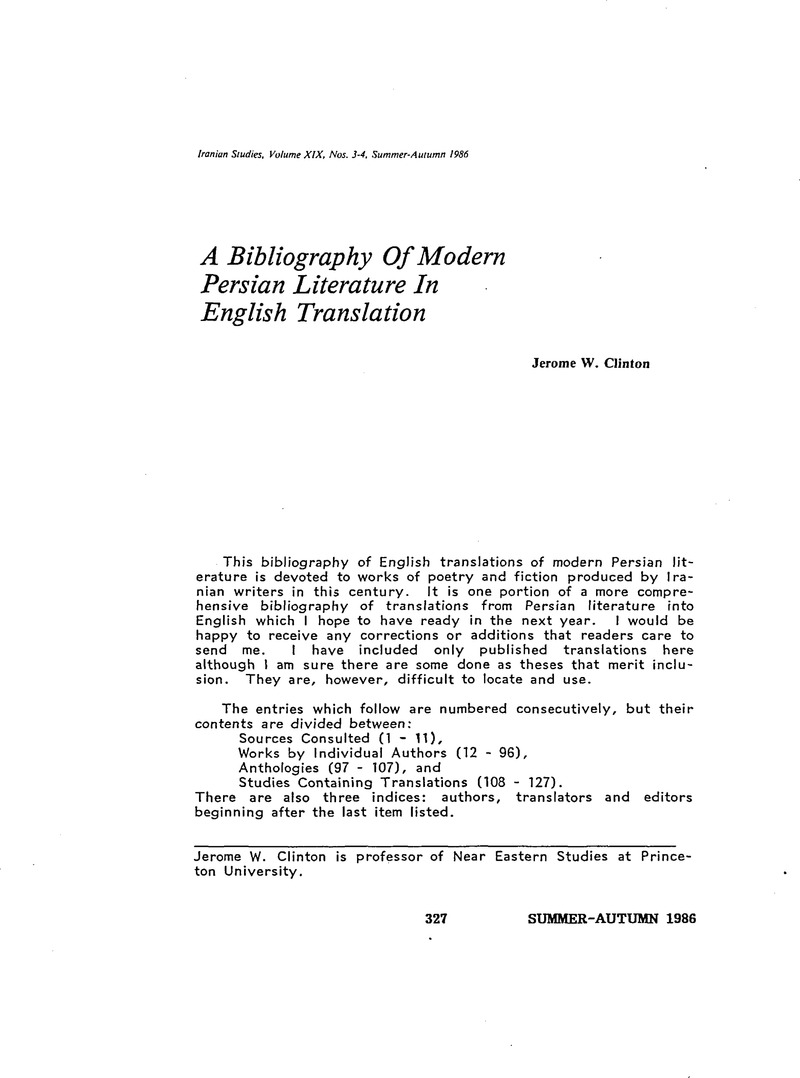Selected poems from the works of twenty-six modern poets together with brief introductions to their lives and works. This is by far the largest and most comprehensive collection of contemporary Persian poetry available in English, and includes many authors not translated elsewhere: Nima Yushij, "On the Riverbank," "Moonlight," "Makhola," "Taptap," "Barque," "It's Night," "My House is Cloudy," "Woe and Wellaway"; Fereydun Tavallali, "Moonlight"; Manuchehr Sheybani, "Candle Mass"; Esma'il Shahrudi, "Disast e r , " "Dream"; Ahmad Shamlu, "Allegory," "Nocturnal," "Tablet," "Dark Song," "May My Prison…," "Aida in the Mirror," "The Last Arrow," "The Gap," "The Song of Abraham in the Fire"; Hushang Ebtehaj, "Coral," "Night-Bound," "Feeling"; Siavosh Kasra'i, "Historical," "The Story of the Nay-Saying Man"; Nosrat Rahmani, "Friday Afternoon in the Fall," "Turn"; Bizhan Jalali, " … , " " … " ; Mehdi Akhavan- Saless, "Lament," "My Grove," "Inscription," "The Return of the Ravens"; Sohrab Sepehri, "The Primal Call," "To the Companions’ Orchard," "As Long as There Are Poppies,"; Nader Naderpur, "Ghom," "Faraway Star," "Pygmalion," "Unsaid"; Manuchehr Ateshi, "Daggers, Kisses, Promises," "Mountain Song"; Yadollah Roya'i, "Sea Song 14," "Sea Song 33"; Mahmud Azad, "Mirrors Are Empty," "Not Man Alone"; Mahmud Kianush, "Minds of Mirror," "Silence"; Forugh Farrokhzad, "Those Days," "The Wind Will Take Us," "The Wind-Up Doll," "My Lover," "Gift," "Mate," "The Bird Was Only a B i r d , " "I'll Be Greeting the Sun Again," "Friday," "Another Birth," "Someone Who Isn't Like Anyone," "I Pity the Garden"; Manuchehr Neyestani, "Factory"; Mohammad Hoquqi, "Intercourse," "The Day Was the Day of Rain"; Meymanat Mirsadeqi, "After the Rain"; Mohammad AN Sepanlu, "Meditation in the Night," "Sidewalk 5"; Esma'il Kho'i, "Chain," "Cycle," "Limbo"; Kiumars Monshizadeh, "In the Years before Astronomy," "An Inn along the Road," "A Colorful Dream," "Song," "The Sad Territory of Don Quixote"; Mohammad Reza Shafi'i-Kadkani, "Necessity," "Look What You See There"; Ahmad Reza Ahmadi, "Story," "A News Story".
Google Scholar